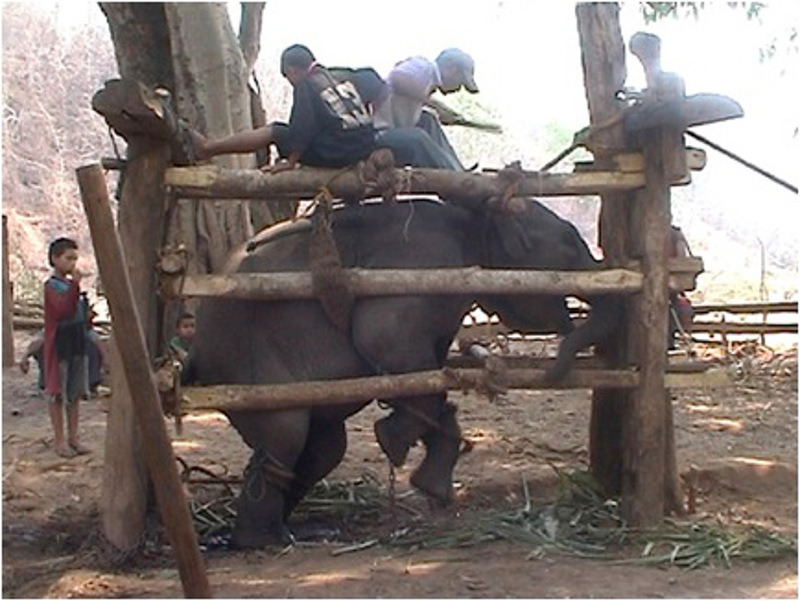A friend of mine told me that elephants used for tourism in Thailand are mistreated. They are taken away from their mothers in the wilderness and brought to a station where they are tortured to make them calm, ready to be ridden by everyone. This process is called "cracking". Is this true? How exactly does this process work? Why do the gameskeepers not react?
-
1I am not sure the word "tortured" is the best one to use, training or breaking is more appropriate. Consider that a horse is broken or trained with different end results. Thirdly there is abuse, which often occurs when poorly equipped people attempt to train animals.– James JenkinsCommented Feb 26, 2017 at 10:48
-
3What exactly is the question? The practicality of trapping Thai elephants? The legality? The prevalence? The process of training elephants? the legality? The prevalence of illegality? Linking the wikipedia it might help people start if this is on topic.– user8348Commented Feb 27, 2017 at 21:59
1 Answer
Yes, there are reports of this happening. A quote from Time:
According to wildlife-advocacy group TRAFFIC, poachers in Burma, officially known as Myanmar, corral elephants into jungle pits, after which older animals are slaughtered and the more valuable young ones tortured into submission before being trafficked over the porous border to entertain tourists vacationing in the self-styled Land of Smiles. (Formerly, elephants in Burma might have been put to work in the logging industry, but recent curbs have put this trade under threat.)
Sangduen Chailert, popularly known as Lek, has worked in elephant conservation in her native northern Thailand for 20 years. “When they catch a wild baby elephant, some [poachers] told me that in the jungle it’s like a killing field,” she tells TIME. “To take one baby they must kill the mother and the aunties, and it is very risky for the baby as it’s difficult for them to survive without their mothers.”
The article goes on to mention some numbers:
The TRAFFIC study says up to 81 live elephants were illegally captured for sale to the Thai tourist industry between 2011 and 2013.
In 2002, National Geographic Today wrote an article on this in which the breaking process is described:
Just before dawn in the remote highlands of northern Thailand, west of the village Mae Jaem, a four-year-old elephant bellows as seven village men stab nails into her ears and feet. She is tied up and immobilized in a small, wooden cage. Her cries are the only sounds to interrupt the otherwise quiet countryside.
The cage is called a "training crush." It's the centerpiece of a centuries-old ritual in northern Thailand designed to domesticate young elephants. In addition to beatings, handlers use sleep-deprivation, hunger, and thirst to "break" the elephants' spirit and make them submissive to their owners.
To get an idea of what this looks like, below is a picture from onegreenplanet.org (picture redacted because it contains a graphic image, hover over the quote below to show):
There is also a video showing more details, it's on YouTube and it's age-restricted.
As for your last question:
Why do the gameskeepers not react?
This is difficult because wild animals live in large areas. In Thailand (I'm not up to date on the situation in Myanmar, but it being a poorer country doesn't indicate to me that the animals would be better protected) the national parks are somewhat guarded, that is, the roads in an out of the parks are but it's not like you couldn't get in and out avoiding the main roads if you wanted. Of course, the illegal stuff (selling those animals, but also illegal logging, etc.) being very lucrative and those countries being rather poor also opens up the issue of corruption, they could try to pay their way in and out.
Attribution
Campbell, C. (2014). Elephants Are Tortured and Trafficked to Entertain Tourists in Thailand. Retrieved from http://time.com/2965190/burma-myanmar-thailand-elephants-trafficked-tortured-tourism/
Christian, P. (2015). The Barbaric Tradition of ‘Breaking the Spirit’ of Elephants for Their Use in the Tourism Industry. Retrieved from https://www.onegreenplanet.org/animalsandnature/breaking-the-spirit-of-elephants-for-use-in-the-tourism-industry/
Hile, J. (2002). Activists Denounce Thailand's Elephant "Crushing" Ritual. Retrieved from https://web.archive.org/web/20080302132856/http://news.nationalgeographic.com/news/2002/10/1016_021016_phajaan.html
-
2Hi JJJ! Wow, this is an incredibly well-researched and thorough answer!! I tend to be very sensitive to the plight of animals, and reading this breaks my heart and makes me physically sick. Thank you so much for covering the image! I hope you don't mind, I put some space before and after it, because I was having trouble moving my mouse around the text without accidentally opening it. If I've overstepped, I apologize, and hope you'll just put it back the way you had it! Commented Mar 19, 2019 at 21:23
-
1@Sue sure thing. As for animal welfare, I think tourists are getting more aware of it and choose to go to venues that pay more attention to it (no riding and such, so I think also less need for breaking them psychologically). I know for sure that if you do a bit of research you can see many elephants (and other animals) in sanctuary places and get a more educative experience. Example: Elephant Hospital in Lampang, Thailand.– JJJCommented Mar 19, 2019 at 21:34
-
1@Sue another one I can highly recommend is the Gibbon Sanctuary in Mae Sot where you can actually volunteer to help feed the animals and do other animal tasks (mostly cleaning up I guess ;)). With such places being a lot less focused on ripping off tourists, I think they're more fun too (and I'm sure you have similar set-ups in many other countries as well). So Google before you go.– JJJCommented Mar 19, 2019 at 21:36
